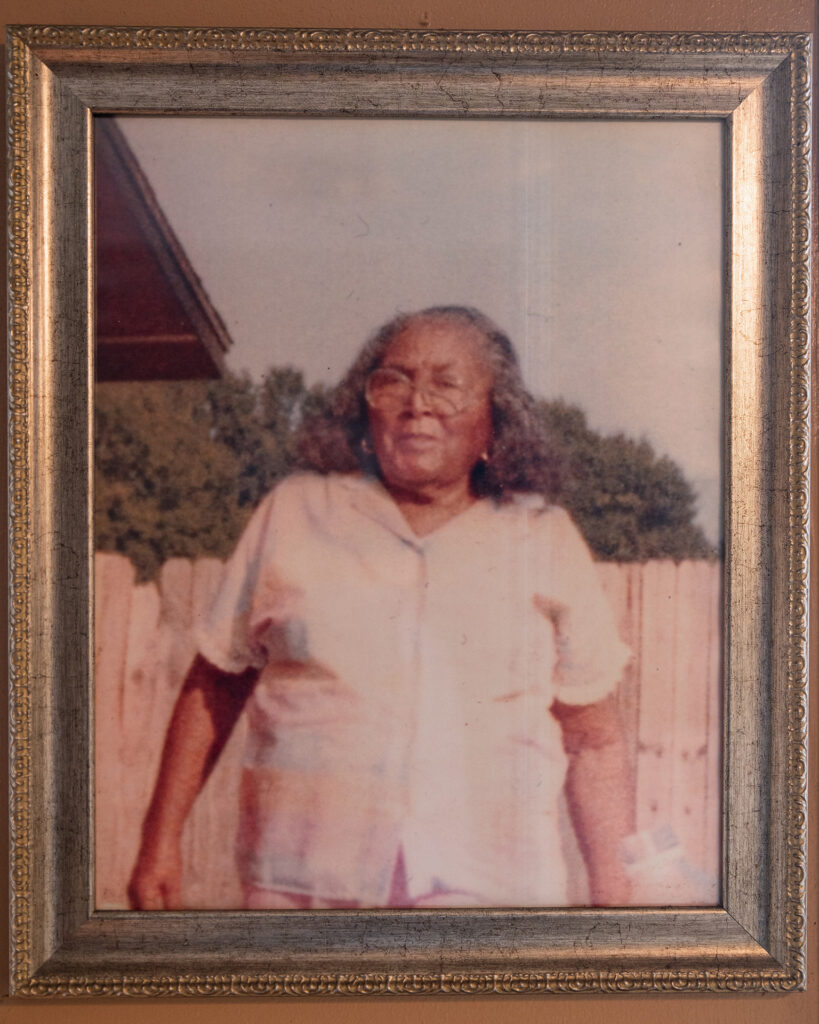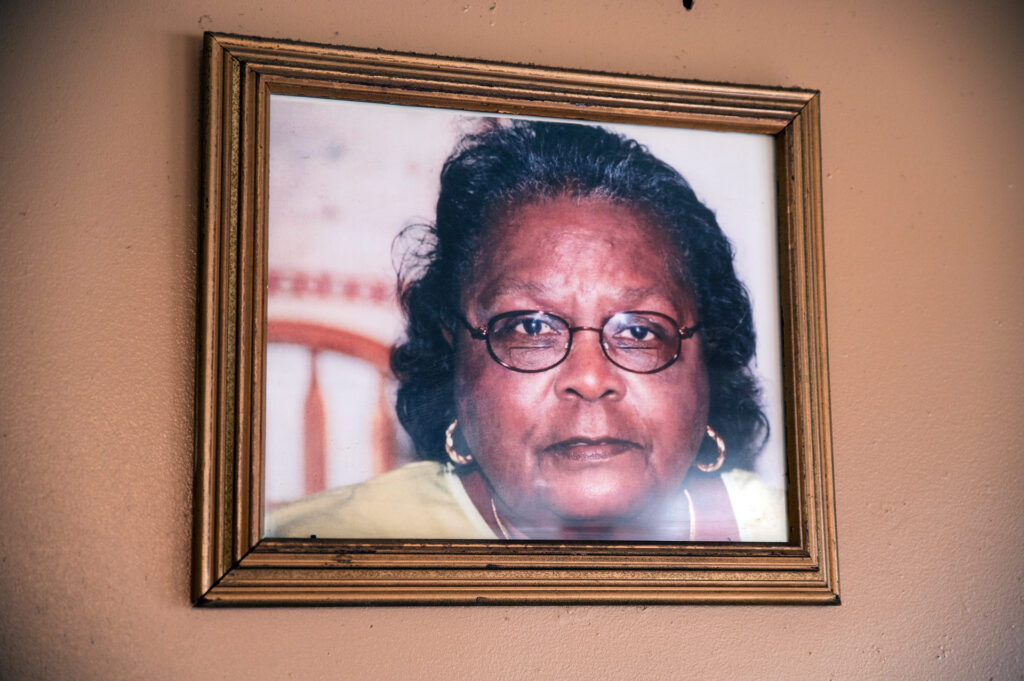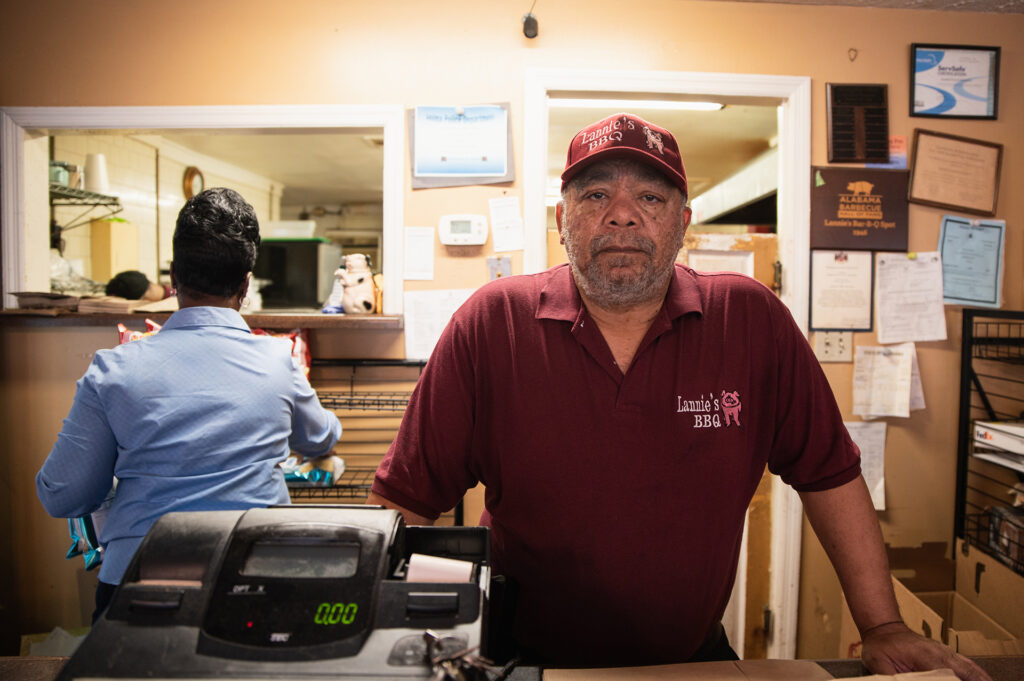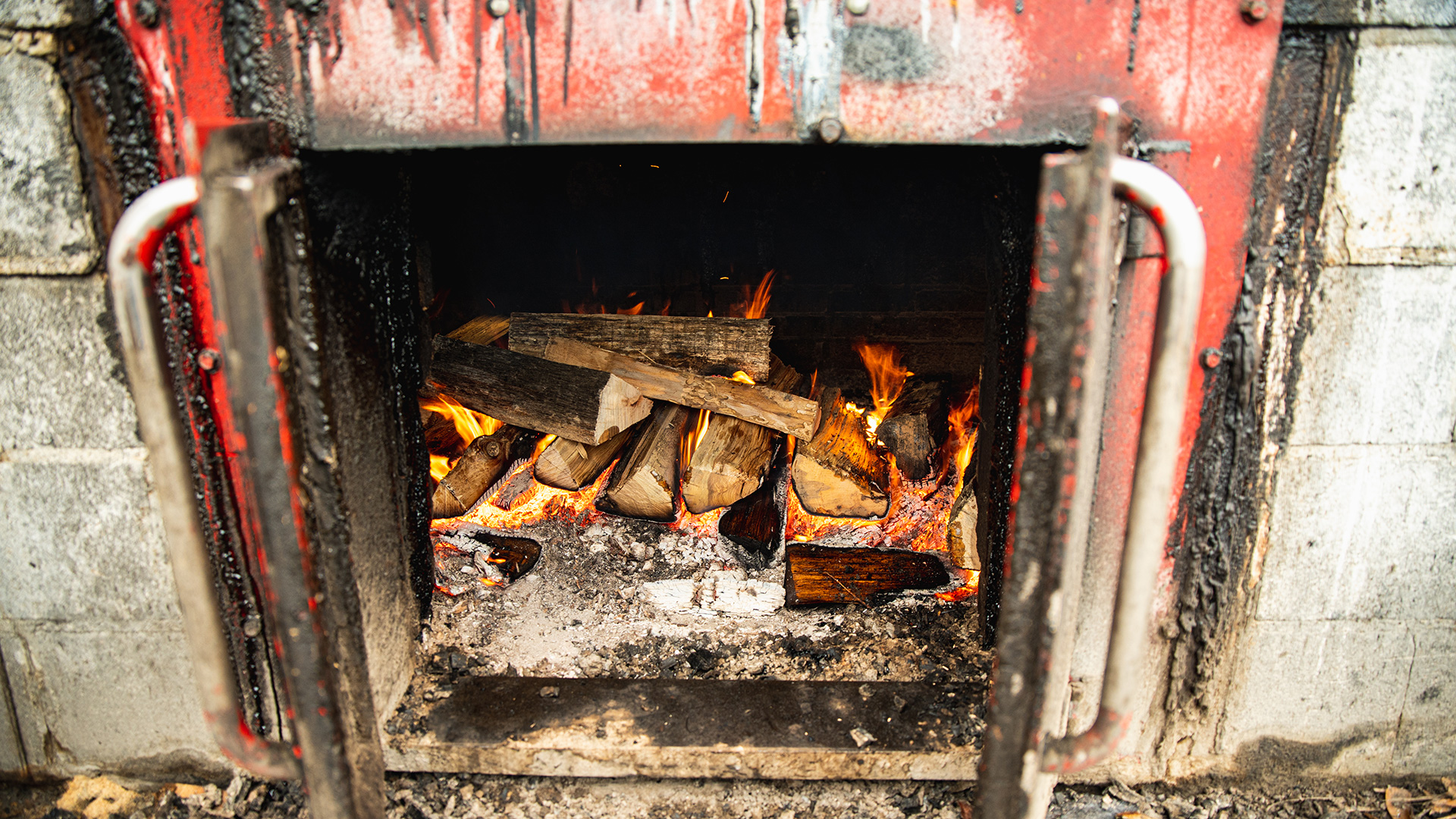
Where There’s Smoke…
At two venerable Alabama barbecue institutions — Archibald's in Northport and Lannie's in Selma — the seasoning isn't in the rub. It's in the wood.
Deondre Richardson spears a slab of ribs and twirls it with a quick wrist snap like it’s an umbrella in a New Orleans second-line parade, turning rack after rack with easy precision. His spear is a custom-made model, a hoe handle darkened with soot and sauce, with a carving fork at the end held in place by a hose clamp.
The varnish is worn thin in places, like the handle of a baseball bat or a shovel that carries the imprint of its owner’s hands. Whole slabs of pork spareribs — not the trimmed St. Louis style — crowd a wire-mesh grate, with hickory wood smoldering below them. Pork butts sit between the slabs, and the well-worn, blackened grate bows from the heat and weight. On occasion, Richardson sprays the meat down with a hose attached to the wall beside the open chamber of the chimney, causing smoke to billow upwards. It is both a cooling and seasoning technique, which is followed by a quick mop of the thin, rust-colored barbecue sauce that sits in a worn pot above the fire. This is yeoman’s work risen to art.
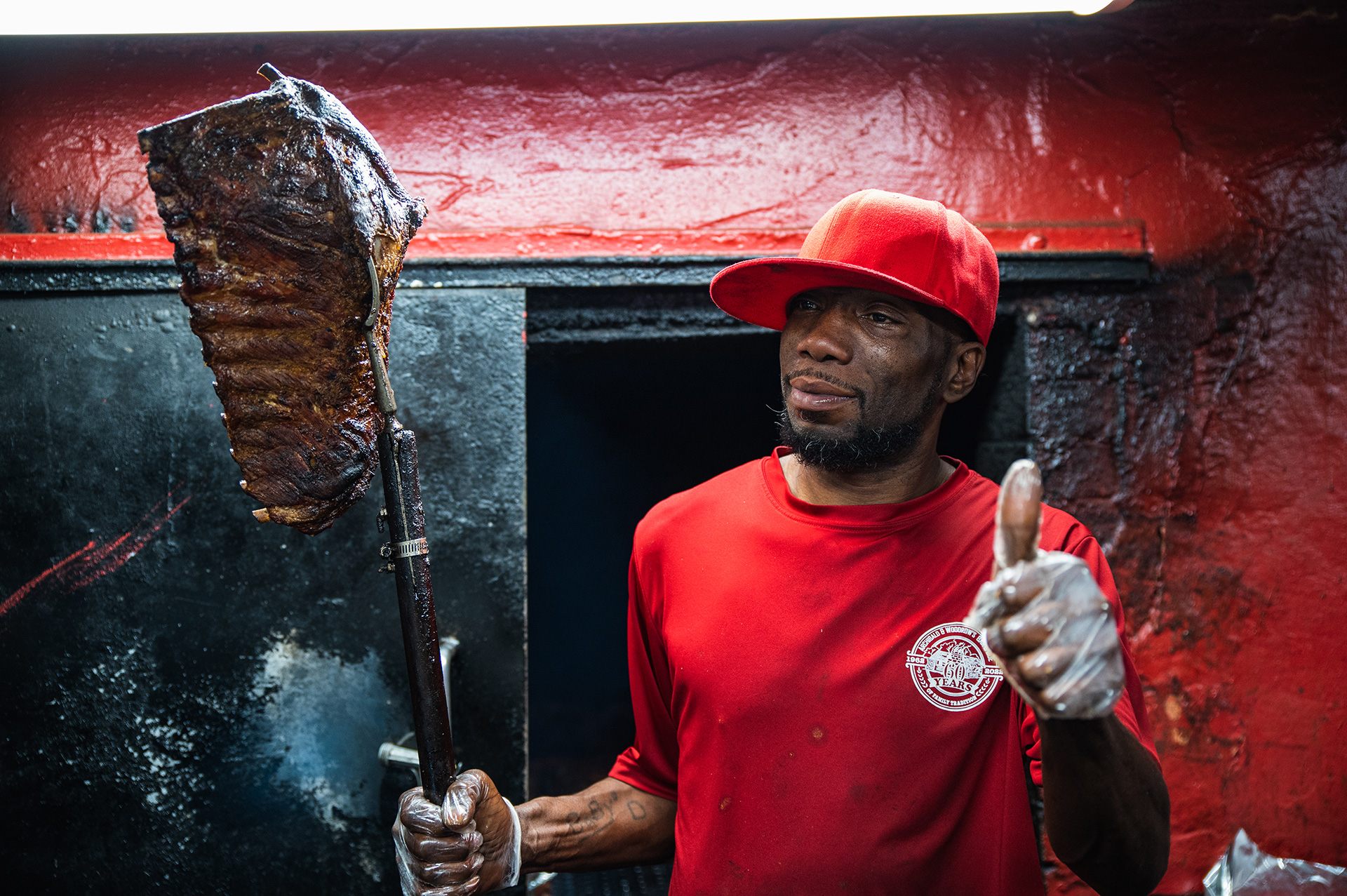
For 21 years, Richardson has cooked ribs and pork butts over the open fire at Archibald’s, a small barbecue shack at 1211 Martin Luther King Blvd. in Northport, Alabama, founded in 1962 by George Archibald Sr. and his wife Betty. The original pit is still the centerpiece of the restaurant, but George and Betty’s grandson, Woodruff Washington III, now owns and operates the restaurant along with the third generation of family members. And the pork barbecue that is served here is distinguished. This isn’t the low and slow, smoke-heavy barbecue of Texas or the saucy sweet style of Kansas City, but something different — something distinctly western Alabama.
The fire itself is the first tell, a fire Richardson feeds with split hickory wood. It is a direct heat, more akin to jerk than to what most people associate with barbecue, and Richardson knows every hot spot and cool spot in the cooking chamber.
“The hickory wood is the seasoning,” Richardson says sibilantly, mimicking the sound of the burning wood below. “No salt, no pepper.”
“The hickory wood is the seasoning. No salt, no pepper.”
— Deondre Richardson
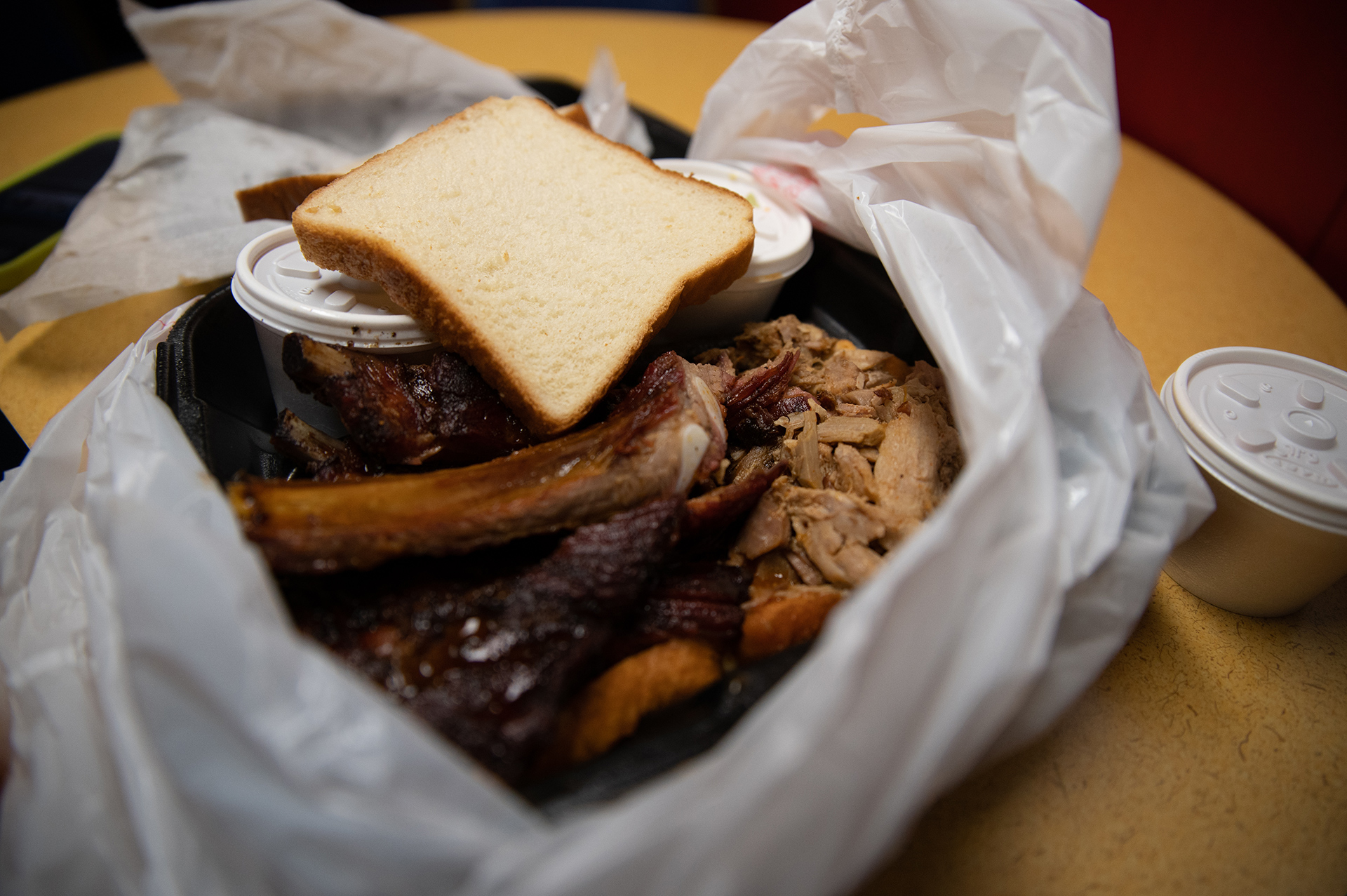
This is a revelation in a world of salt- and sugar-laden barbecue rubs, but a welcome one. The focus is firmly on the flavor of the smoke and the meat, and the alchemy of time and temperature. The simplicity is deceptive, and in less expert hands could be disastrous, but Archibald’s pork, with its lovely char, sings like a church choir.
And then there is that matter of time and temperature.
“The ribs take about 45 minutes, and the pork [butts] about three hours,” says Richardson.
This is a dramatic departure from the fall-off-the-bone ribs and pull-apart pork shoulder that cook for half a day and define barbecue in the popular imagination. The higher heat of the open pit defines Archibald’s barbecue. The ribs are tender, but require a tug to remove from the bone, and the pork shoulder is sliced instead of pulled. Richardson estimates he can cook “38 racks of ribs” at a time and goes through “20 to 30” pork butts a day. And each rack and butt is periodically basted with the signature sauce that defines the barbecue of this region.
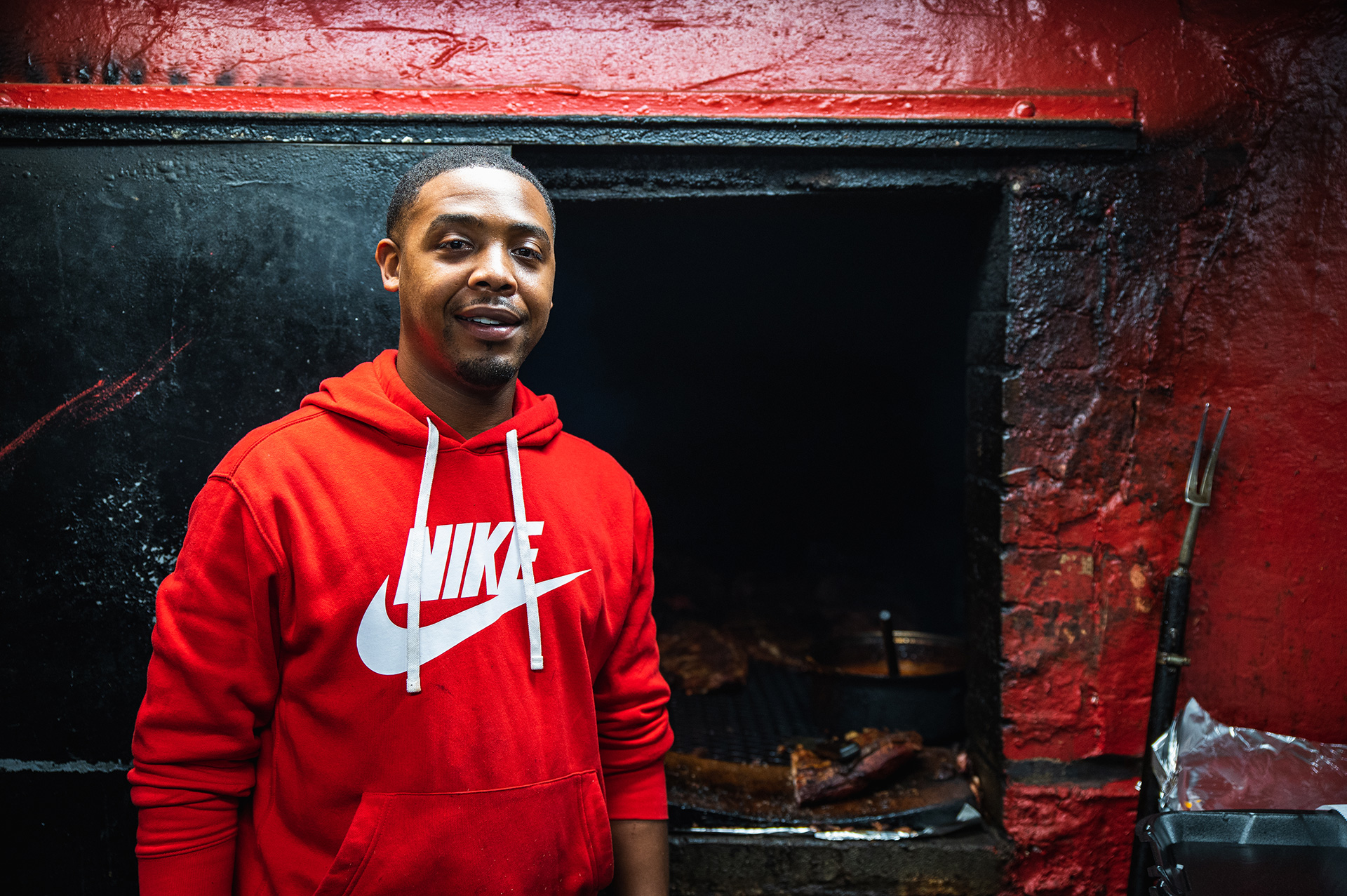
“It’s the sauce that everyone loves,” says Keontaé Washington. “It’s a liquid-based sauce.”
Washington, the great grandson of George Archibald, Sr., speaks almost shyly about the sauce, and upon questioning doesn’t reveal too much: The recipe is a closely guarded secret. A friend of mine, whose name I will not reveal, once went through the contents of the Archibald’s dumpster back in the 1970s to try and figure out the recipe. To this day he is still stumped. But the style of the sauce is unique to western Alabama and the Black pitmasters who have perfected the barbecue of this region. It is a thin sauce, more tangy than sweet, with a pleasant amount of heat and smoke. It coats but isn’t cloying and is as integral to the meat as the hickory smoke. The sauce is a unifier. It brings the flavors together.
It also brings people together.
Like many great Southern barbecue joints, Archibald’s resides in a traditionally Black neighborhood, but its patrons are both Black and white. In a place where, in many regards, division is still de facto, food is a unifier. It is a language that is easily understood in a world where it is all too easy to look past and talk past each other. Barbecue is its own church, and it welcomes everyone.
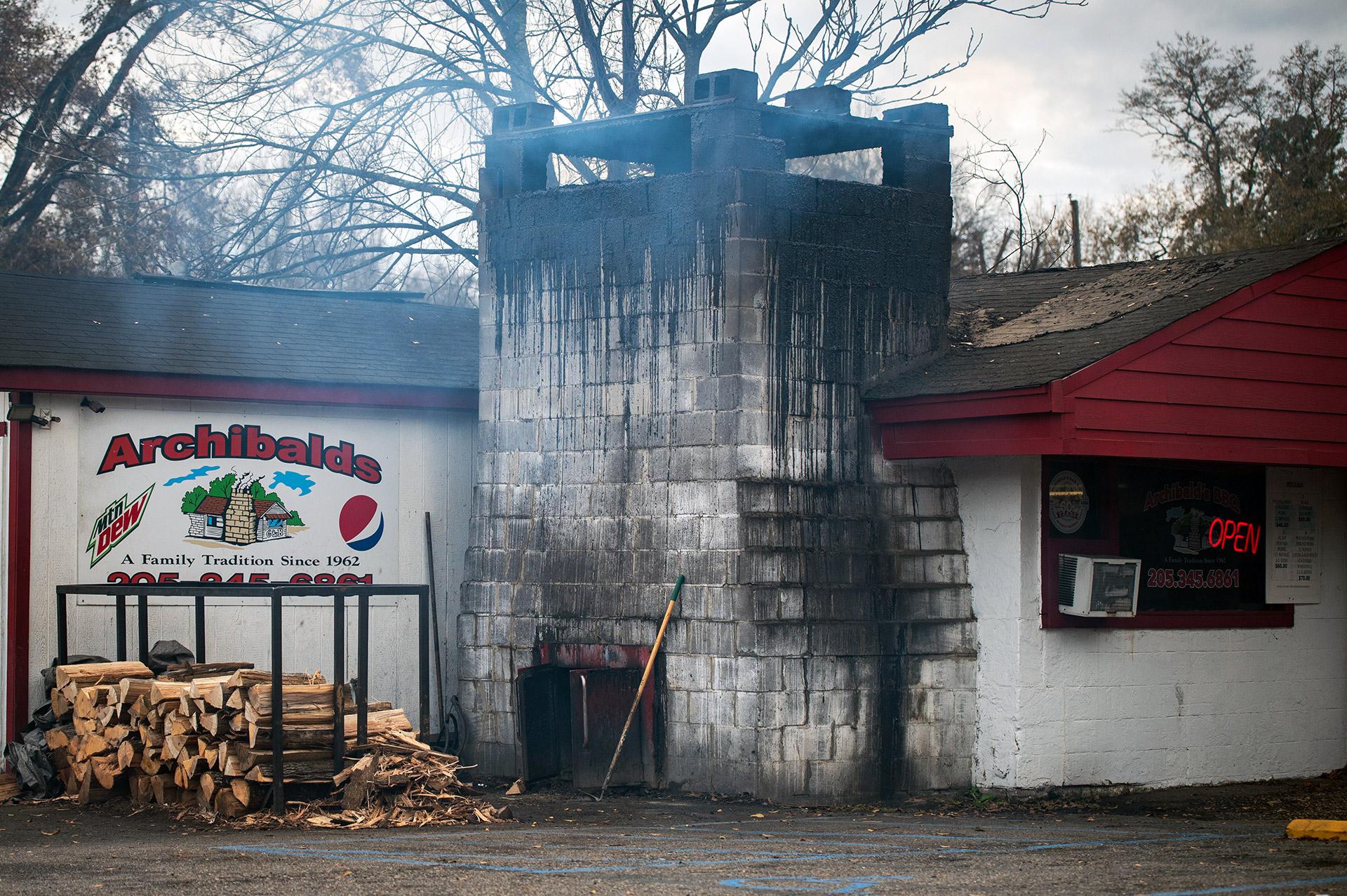
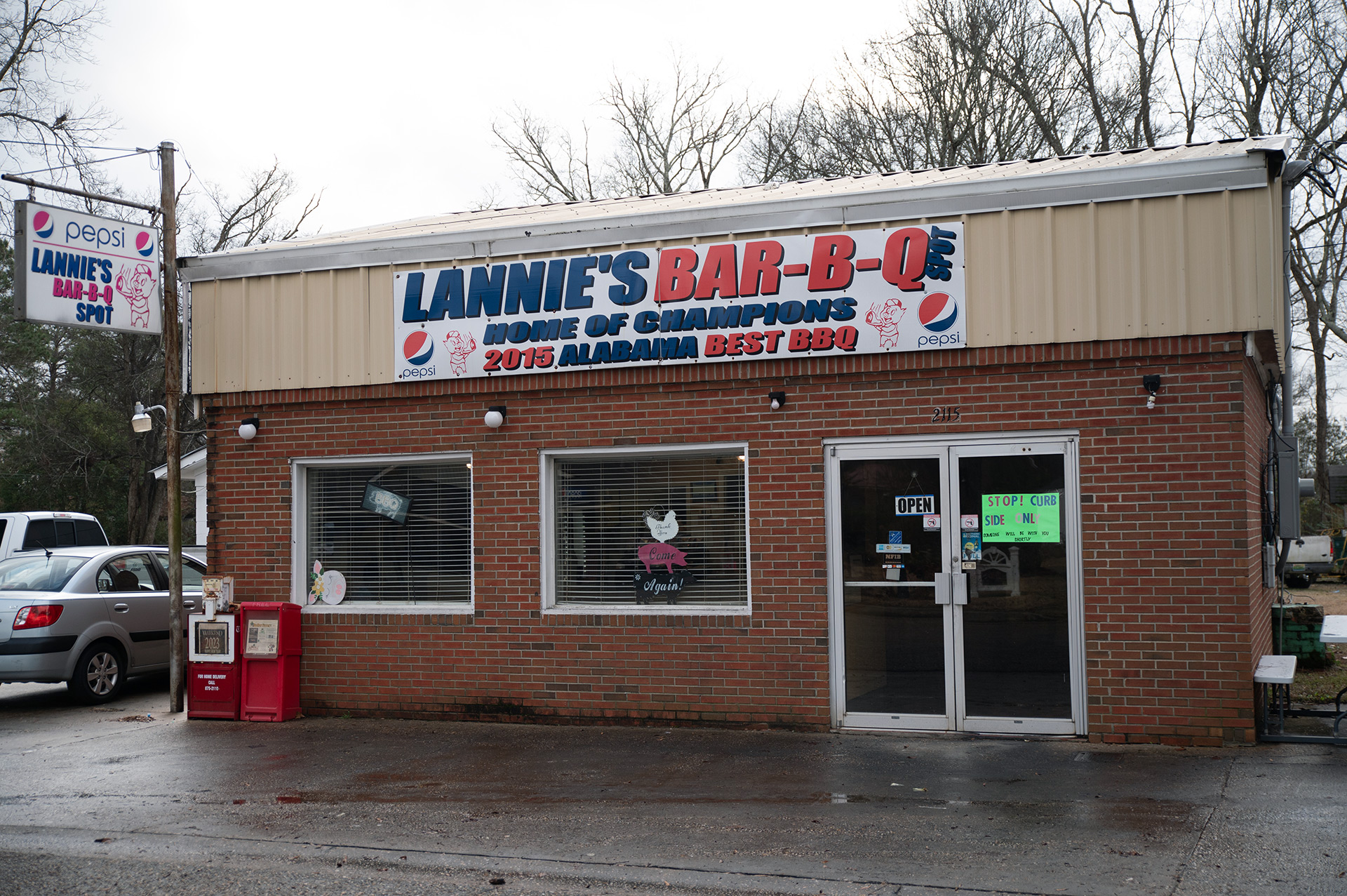
Meanwhile, in Selma...
Seventy-nine miles south of Northport, with a slight jog to the east, lies Selma, Alabama. Selma is a small, sleepy town, and its countenance belies the fact that it was one of the defining sites of the Civil Rights Movement of the 1960s. It was here that Dr. King staged the March to Montgomery, and a young John Lewis got his skull cracked open by police on “Bloody Sunday” while crossing a bridge named after a Ku Klux Klan leader.
It is also home to Lannie’s BBQ Spot at 2115 Minter Ave. in East Selma.
“When I was growing up there, Selma rotated around two barbeque poles, Hancock's barbecue out in West Selma and Lannie’s in East Selma,” says Tad Bartlett, a current New Orleanian and barbecue aficionado (and Salvation South contributor) who was raised in Selma. “Selma was always a town that was fairly segregated by the compass points. West Selma being predominantly white and East Selma being predominantly black. But the barbecue joints were kind of an exception to that.”
Bartlett is the one who, years ago, first turned me on to Lannie’s. He told me, in no uncertain terms, that it was the best barbecue he’d ever had. I can still remember the first time I had the pork sandwich.
“Seventy-seven years as a family business. That’s my grandmother, Ms. Lannie, over there. That's my mother, Lulu, there. She lives across the street.”
— Floyd Hatcher
On my first trip there, I sat in my car in the small parking lot adjacent to the low brick building that houses Lannie’s as the residents of the neighborhood regarded me with curiosity — not because I was white but because I looked decidedly non-Alabaman with my backwards Kangol hat, my Guayabera shirt and my sunglasses, like Elwood Blues’ long-lost cousin. I unwrapped the foil-packaged sandwich like Charlie Bucket looking for the golden ticket, and then looked down at the white shirt I was about to sacrifice. The simple, satisfying sandwich — a heaping portion of pulled, smoked pork, lightly sauced, between two pieces of white bread with no coleslaw or pickles to distract you from the perfectly smoked meat and sauce — was as memorable as a first kiss.
Lannie Hatcher and Will Travis started smoking pork at this location in the 1940s. Lannie passed the business down to her daughter, Lulu Hatcher, who ran it until her recent retirement. LuLu still lives across the street from the restaurant, but it is her children, Floyd, Al and Deborah Hatcher, along with Deborah’s son Corey Hatcher, who currently handle the day-to-day operations, and they start early.
“My son puts the meat on maybe 12 o'clock at night and then he comes in in the morning to take it off,” says Deborah Hatcher. Open from 8 a.m. to 8 p.m., Lannie’s is almost a 24-hour operation when you figure in the cooking and clean-up time.
Floyd Hatcher leans on the counter by the register, his compact, powerful frame relaxing as he talks about his family history.
“Seventy-seven years as a family business,” he says, and then gestures to the photos on the wall. “That’s my grandmother Ms. Lannie, over there. That's my mother, Lulu, there. She lives across the street.”
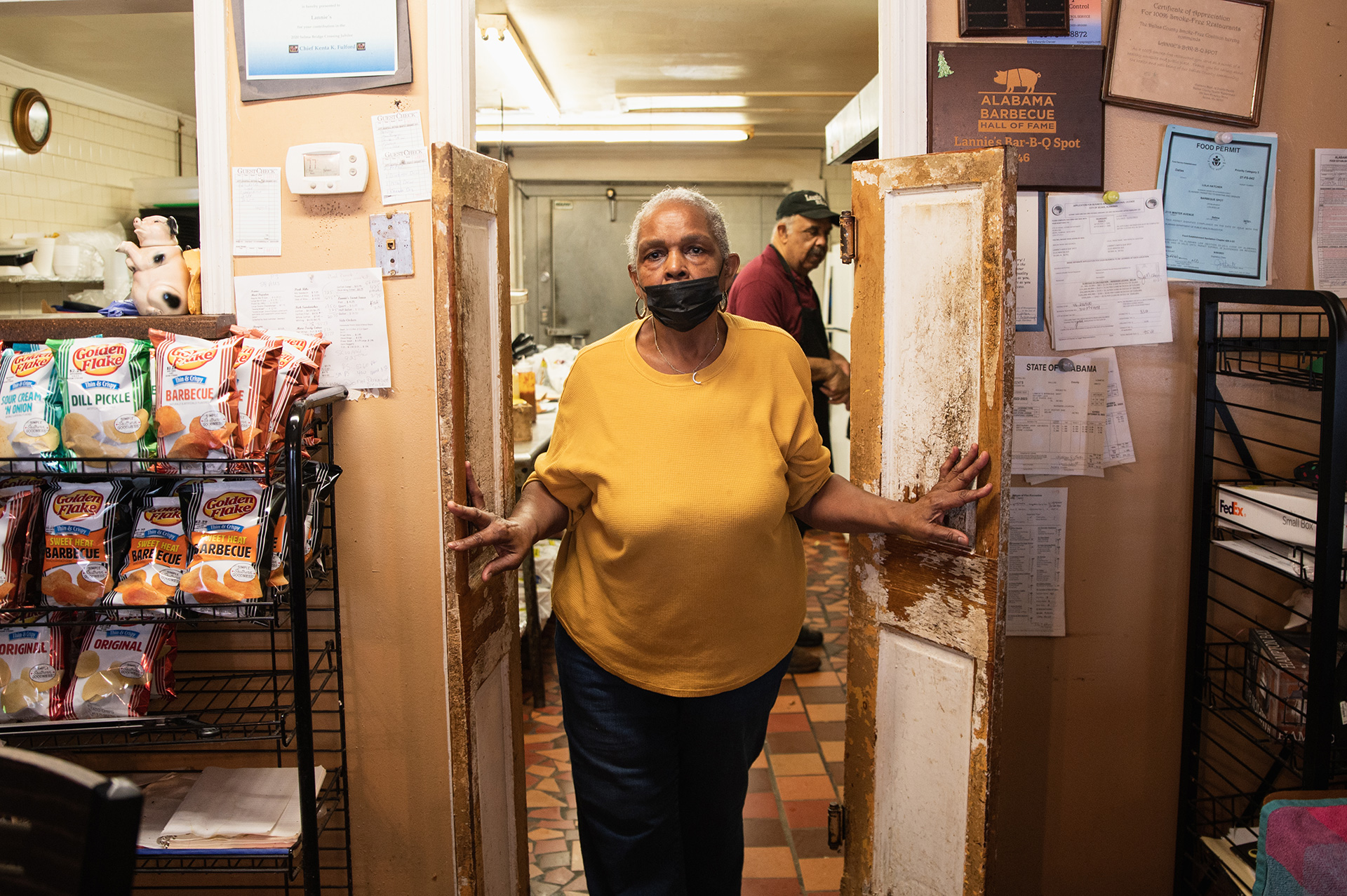
“My son puts the meat on maybe 12 o'clock at night and then he comes in in the morning to take it off,” says Deborah Hatcher. Open from 8 a.m. to 8 p.m., Lannie’s is almost a 24-hour operation when you figure in the cooking and clean-up time.
Floyd Hatcher leans on the counter by the register, his compact, powerful frame relaxing as he talks about his family history.
“Seventy-seven years as a family business,” he says, and then gestures to the photos on the wall. “That’s my grandmother Ms. Lannie, over there. That's my mother, Lulu, there. She lives across the street.”
While Lannie’s is steeped in history, it has adopted more modern cooking techniques, including a wood-fired smoker instead of the open pit it had in the past. But Lannie’s still stays true to its roots with its choice of fuel.
“I use hickory and pecan wood,” Hatcher says.
The pecan imparts a sweetness to the meat and cuts the sharp, smokey hickory. Lannie’s ribs and pork shoulder are cooked slightly more tender than Archibald’s, but still have bite. And the sauce, slightly thicker, with more heat, clings to the meat like Spanish moss to a live oak.
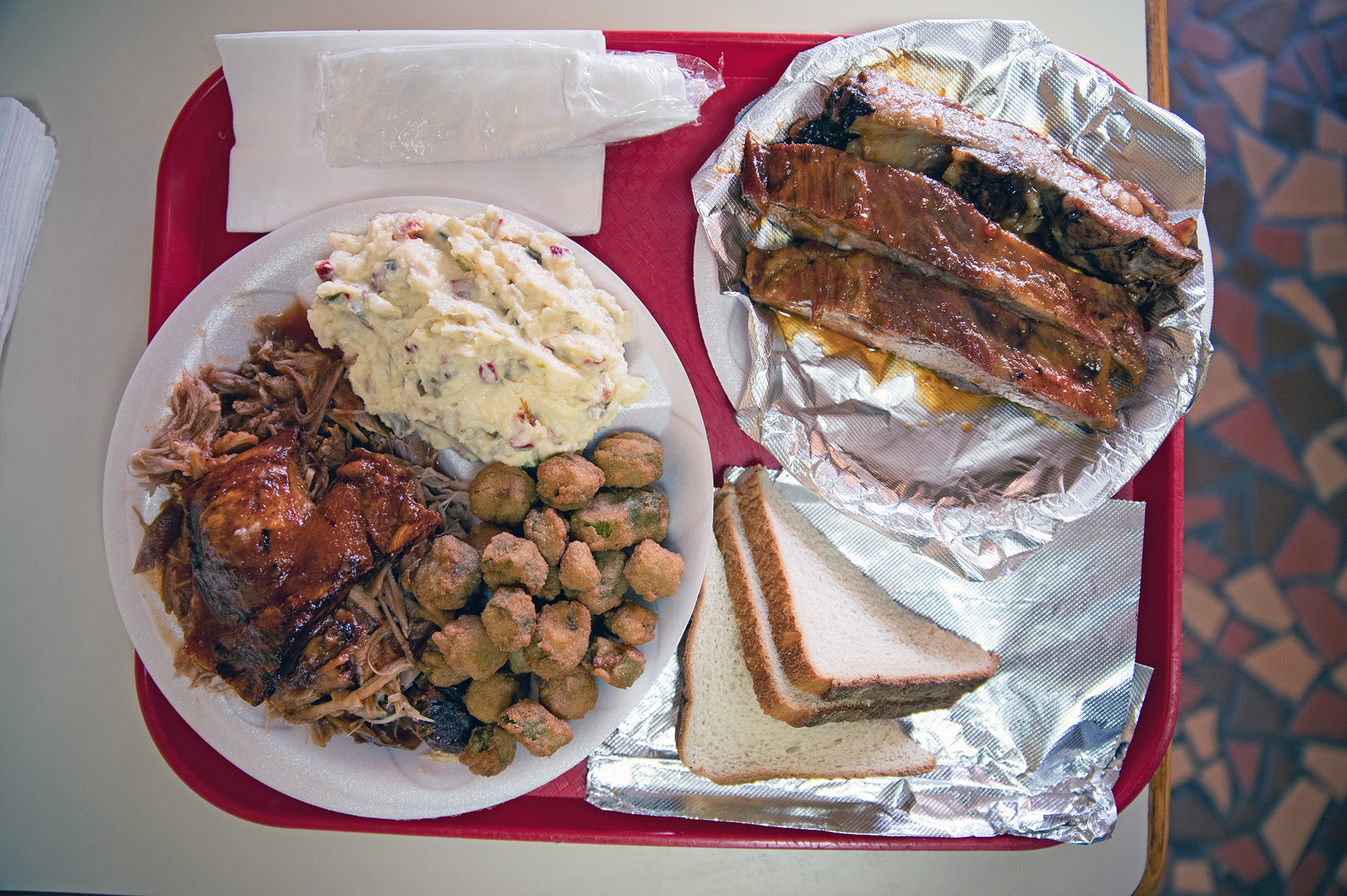
Longtime employee Ms. Gloria balances a cafeteria tray and carries it out of the kitchen and presents it to me with a smile. It is a sampler platter – for twelve, apparently – and it’s the largest tray of food I’ve seen in recent memory. There is a generosity and welcoming spirit here that is undeniable.
And on Sundays, they really throw down.
“Soul Food Sundays,” says Deborah Hatcher with a smile. “Oh, we have a good time. We have about 10 different kinds of meat, and we have what eight to 10 vegetables every Sunday. We have fried chicken, baked chicken, turkey wings, hamburger steak, fried and smothered pork chops, liver, pigs’ feet.” Her voice trails off as she ticks off item after item. And you get everything for “only 12 dollars.”
I left Lannie’s the same way I left Archibald’s, with a heavy box of barbecue that would sustain me for at least another day, if not two. Driving out of Selma, I stopped at Live Oak Cemetery. It looked like it was straight out of a Southern Gothic novel. The branches of the oak trees, draped heavy with Spanish moss, seemed like arms petitioning in prayer. Neat paths crisscrossed the grounds, and there was an ancient feeling to it. Except for the center of the cemetery, a one-acre circle owned by the United Daughters of the Confederacy, which is dedicated to perpetuating the racist Lost Cause mythology. Their circle is ringed with Confederate flags and houses a newish bust of Confederate General and Ku Klux Klan Grand Wizard Nathan Bedford Forrest. It seemed a harsh anachronism, not an acknowledgement of history but a statement of defiance. It made me uneasy and ashamed.
“How do you get a place like Lannie's?” says Bartlett, musing the questions of food and race over the phone. “People in Selma will have spaces where they do come together. Those spaces don't, by and large, include, for instance, churches, and they don't include a lot of restaurants, but Lannie's is one of those spaces. And in part, maybe it's just because it's such a small town. It's not big enough for people to completely separate themselves out from each other. They're forced to see each other as fellow human beings.”
But as if not totally convinced by his own answer, Bartlett pauses for a moment before adding compellingly, “And the food is damn good.”
Sometimes it’s as simple as that.
Note: On January 12, 10 days after my visit, a tornado damaged Lannie’s BBQ Spot, as reported in the Selma Sun. The tornado also damaged the nearby homes of the Hatcher family, who own Lannie’s. The Hatchers had been planning to renovate the restaurant before the tornado struck, and are currently in the planning phases. At press time, they had not set a reopening date.
James Cullen is a New Orleans photographer, writer and chef whose muse is the rich culture of his city and the back roads of Alabama, Kentucky and Tennessee. His work has appeared in Business Insider, The Times-Picayune, Gambit, Antigravity Magazine, and The Peauxdunque Review.

